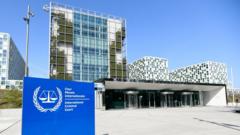Event JSON
{
"id": "57499e31a1b535a1713fb48ff25563ec24b6b7d6c564204a877393180451696b",
"pubkey": "d771f820697df1b1150207429a7052ca3e4a3427abd12ee6b363c303dd86d4bb",
"created_at": 1732212310,
"kind": 1,
"tags": [
[
"r",
"https://www.bbc.co.uk/news/world-11809908"
],
[
"subject",
"What is the International Criminal Court?"
],
[
"published_at",
"1732204894"
],
[
"image",
"https://ichef.bbci.co.uk/ace/standard/240/cpsprodpb/FDED/production/_125450056_d936bd781254996640c33b1a993056a35d1df273.jpg"
],
[
"p",
"d771f820697df1b1150207429a7052ca3e4a3427abd12ee6b363c303dd86d4bb",
"wss://articles.layer3.news"
],
[
"imeta",
"url https://ichef.bbci.co.uk/ace/standard/240/cpsprodpb/FDED/production/_125450056_d936bd781254996640c33b1a993056a35d1df273.jpg"
],
[
"t",
"mainstream:perspective"
],
[
"summary",
"The ICC was established in 2002 to hold rogue leaders accountable for atrocities. It is a court of last resort, intervening only when national authorities cannot or will not prosecute. The court has pursued several high-profile cases, including against Thomas Lubanga, Laurent Gbagbo, and Joseph Kony. It has also issued arrest warrants for several leaders, including Israeli Prime Minister Benjamin Netanyahu and Russian President Vladimir Putin. The ICC has been criticized for its focus on Africa and its lack of US involvement."
]
],
"content": "nostr:nprofile1qyd8wumn8ghj7ctjw35kxmr9wvhxcctev4erxtnwv4mhxqpq6aclsgrf0hcmz9gzqapf5uzjegly5dp840gjae4nv0ps8hvx6jas684m22\nhttps://ichef.bbci.co.uk/ace/standard/240/cpsprodpb/FDED/production/_125450056_d936bd781254996640c33b1a993056a35d1df273.jpg\nThe court has the power to bring prosecutions for genocide, crimes against humanity and war crimes.\nhttps://www.bbc.co.uk/news/world-11809908",
"sig": "d12969b058fa8cbfbbf26e8756963856c656cb80b5628648e61581ad589f061346635b80c6bc49022b407fcc933e35bc3db9a1551cfc17aad3a084e19db664b4"
}


